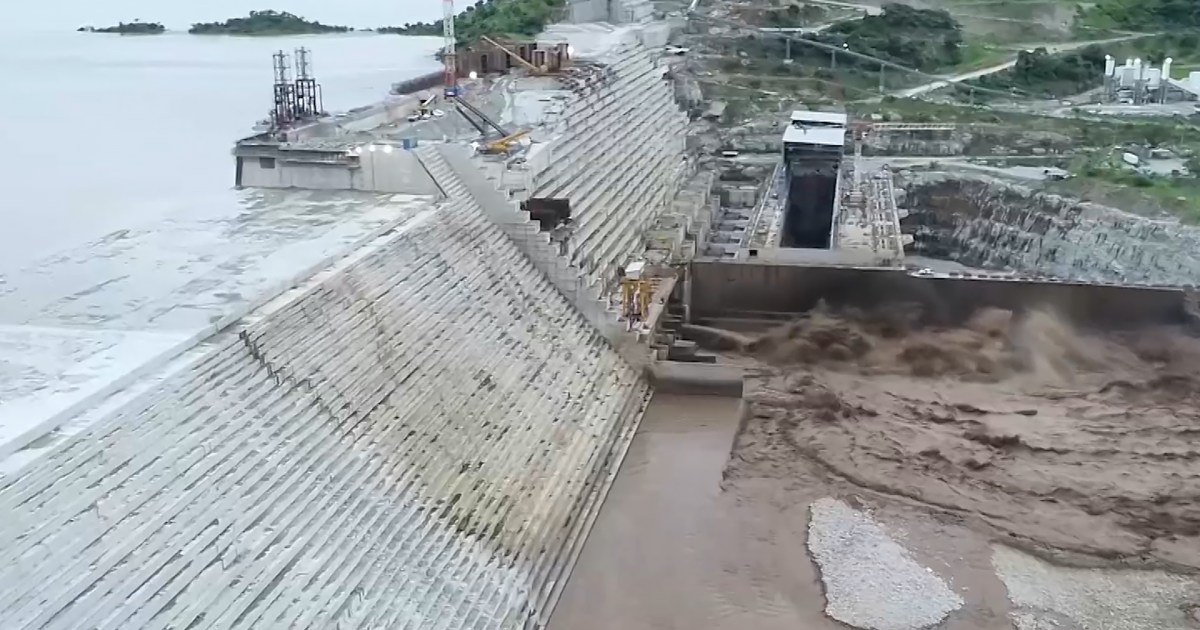Sudan and Egypt intensified their diplomatic moves in an effort to mobilize support for a binding agreement on the Grand Ethiopian Renaissance Dam after the failure of the last round of negotiations in Kinshasa, and Addis Ababa announced its intention to implement the second mobilization of the dam next July.
Sudanese Foreign Minister Maryam Al-Sadiq Al-Mahdi met yesterday, Sunday, in Khartoum with the ambassadors of the member states of the African Union.
During the meeting, Al-Mahdi said that Sudan's firm position is the need to reach a binding agreement before the second filling of the Renaissance Dam.
In the context, a source in the Sudanese Ministry of Foreign Affairs told Al-Jazeera that Khartoum informed the UN Security Council about the complexities of the dam negotiations.
Concurrently, the Egyptian Foreign Ministry spokesman said that Foreign Minister Sameh Shoukry will carry messages from President Abdel Fattah El-Sisi to the leaders of a number of African countries visiting it during a tour that he starts from Kenya, adding that he will inform them of the reality of the negotiations on the Renaissance Dam file.
During his tour, Sameh Shoukry will discuss ways to support the process of reaching a binding legal agreement regarding filling and operating the dam in a manner that takes into account the interests of the three countries, according to the Egyptian Foreign Ministry.
The recent round of negotiations in Kinshasa under the auspices of the President of the Democratic Republic of the Congo Felix Tshisekedi, whose country holds the rotating presidency of the African Union, and the participation of the foreign and irrigation ministers in Ethiopia, Egypt and Sudan, ended without any progress. Khartoum and Cairo exchanged on the one hand, and Addis Ababa from Other hand accusations of thwarting it.
After the failure of this round, Sudanese Prime Minister Abdullah Hamdok invited Egypt and Ethiopia to hold a tripartite summit to discuss the implications of the Renaissance Dam file.
Stuck to the second fill
On Sunday, Ethiopian Prime Minister Abiy Ahmed reiterated that the second mobilization of the Renaissance Dam that his country is building on the Blue Nile River will take place during the rainy season in July and August next, despite the opposition of Egypt and Sudan to take this step before reaching an agreement.
Abi Ahmed said in tweets on Twitter that his country is not seeking to harm the Nile River countries, Egypt and Sudan.
He added that the Renaissance Dam prevented massive floods in Sudan last year, pointing out that completing the filling of the dam in the rainy season would reduce the risk of floods in Sudan.
He pointed out that the torrential rains that fell last year helped complete the first filling successfully, and revealed that before the second filling, his country would release more water that was stored last year in the side spaces of the dam lake known as "Mafayd", and that information would be shared with Egypt and Sudan.
The Ethiopian Prime Minister attached, in his tweets, a new video of the Renaissance Dam, which shows the completion of the water exchange and the flow of water through it.
In July 2020, Ethiopia admitted that it carried out the first single filling of the dam without reaching an agreement with the downstream countries, Egypt and Sudan, and currently it is insisting on a second filling of the dam.
On Friday, Ethiopian Foreign Minister Demiki Mekonnen announced his country's refusal to internationalize the Renaissance Dam file, and stressed that it would not bow to pressure to accept what he described as "colonial treaties" on the Nile, saying that the whole issue would be resolved within the framework of the process led by the African Union "if Egypt and Sudan follow a constructive approach." ", As he says.
The Ethiopian official stressed that his country will not accept unfair conditions through which Egypt and Sudan seek to preserve its water hegemony.
While Ethiopia insists on a second filling of the Renaissance Dam even if it does not reach a tripartite agreement on the dam with Egypt and Sudan, Cairo and Khartoum adhere to first reaching an agreement on filling and operating that preserves their water facilities, and ensures the continued flow of their annual share of the Nile water, amounting to 55.5 billion cubic meters, And 18.5 billion cubic meters, respectively.
For 10 years, the three countries have been holding stalled negotiations, and the African Union has sponsored them for months.

